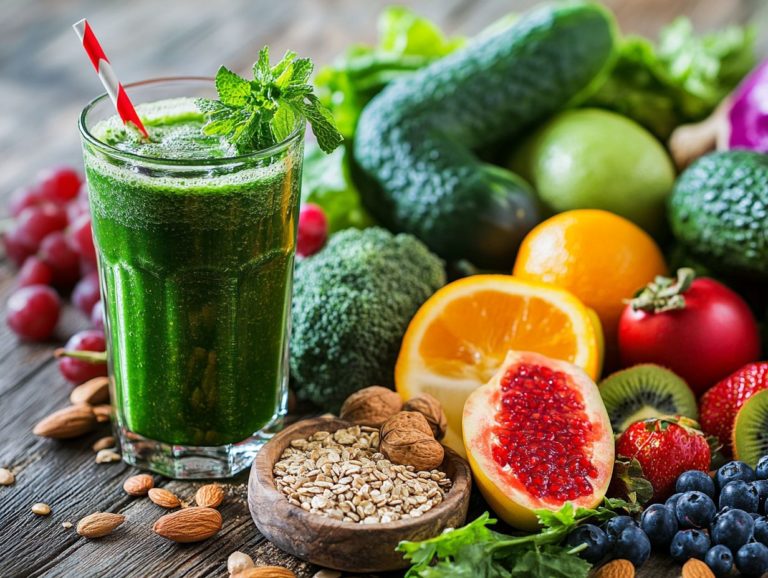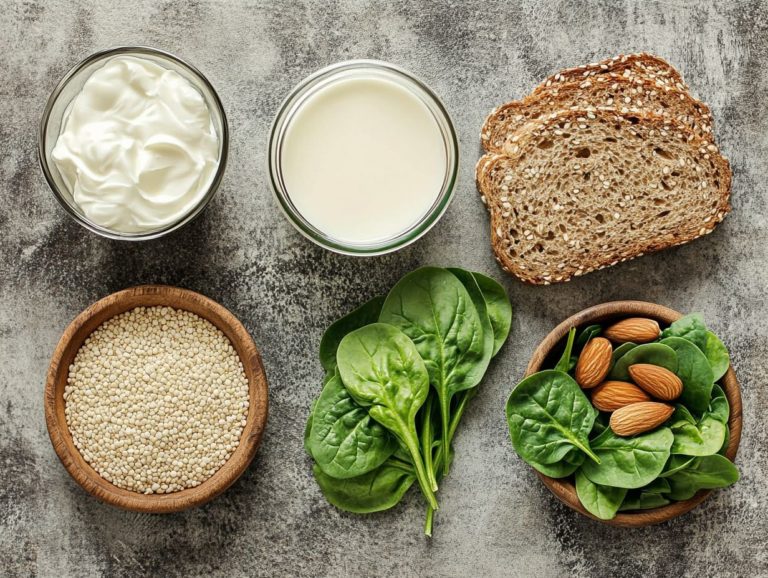5 Essential Nutrients for Healthy Eating
Maintaining a healthy diet goes beyond merely counting calories; it s about nourishing your body with the right balance of essential nutrients.
This article delves into five key components: proteins, carbohydrates, healthy fats, vitamins and minerals, and water. Each is crucial for your overall well-being. It highlights the significance of a balanced diet, guides you on how to ensure you re getting enough of these nutrients, and offers practical ways to incorporate them into your meals, even when dining out.
This article also dispels common misconceptions that may hinder your progress. Don t miss out on uncovering how to effectively fuel your body and embrace a healthier lifestyle!
Contents
Key Takeaways:
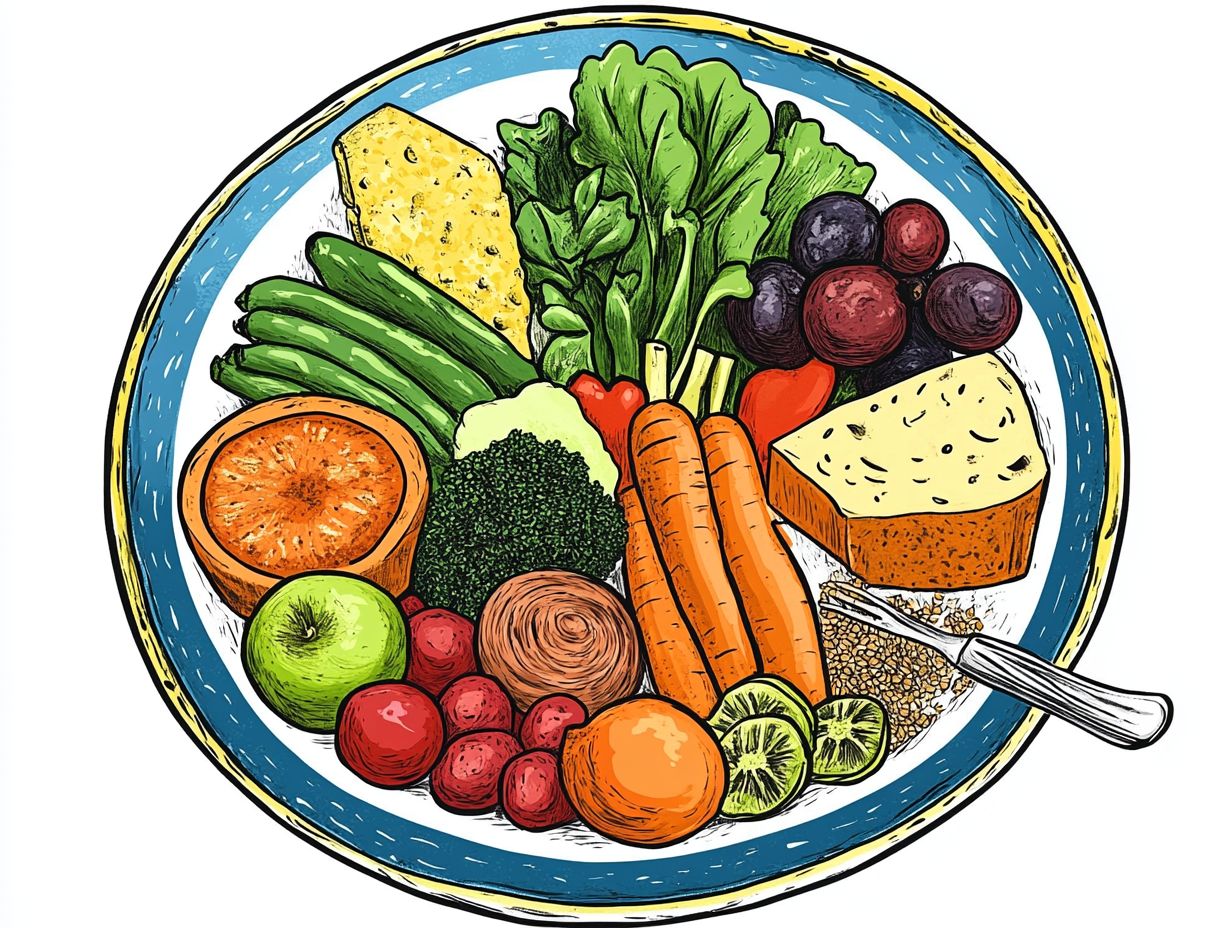
Protein is essential for building and repairing tissues. You can find it in:
- Meat
- Dairy
- Legumes
Carbohydrates provide energy and can be found in:
- Whole grains
- Fruits
- Vegetables
Healthy fats, such as omega-3s, are important for brain function. You can find them in:
- Avocados
- Nuts
- Fatty fish like salmon
1. Protein
Protein is an essential macronutrient. It plays an important role in building and repairing tissues and supporting muscle movement.
For those aiming to elevate their health, knowing where to source this vital nutrient is key. Options include lean meats, dairy products, and legumes, each offering different protein quality.
You can categorize proteins as complete or incomplete based on their amino acid content. Complete proteins are typically found in animal products and are essential for muscle development. Incomplete proteins, primarily from plant sources, often require pairing to form a complete profile.
By ensuring you consume adequate protein through a well-rounded diet, you support optimal muscle growth and enhance your body s ability to recover and thrive.
2. Carbohydrates
Carbohydrates serve as your body s primary energy source. Opting for healthy choices especially complex carbohydrates can profoundly influence your blood pressure and overall health.
These nutrients, found in foods like whole grains, legumes, and vegetables, offer a steady release of energy, helping you maintain physical performance and mental clarity.
Unlike simple carbohydrates, which can lead to quick blood sugar spikes, complex carbohydrates digest slowly, making them particularly advantageous for managing diabetes.
Rich in fiber, complex carbohydrates also promote digestive health and that satisfying feeling of fullness.
By incorporating foods like quinoa, brown rice, and oats into your diet, you boost your energy levels and reduce risks associated with chronic conditions.
3. Healthy Fats
Incorporating healthy fats into your diet is essential for supporting your immune system and promoting overall good health.
These dietary fats can be categorized into unsaturated fats, saturated fats, and trans fats. Unsaturated fats are the most beneficial.
You ll find healthy fats in sources like avocados, nuts, olive oil, and fatty fish. They work wonders for heart health by lowering bad cholesterol levels and offering anti-inflammatory benefits.
Adding these fats to your meals can significantly enhance nutrient absorption, making vitamins A, D, E, and K more accessible for your body.
Therefore, balancing healthy fats in your diet helps you maintain a healthy weight and supports your overall well-being.
Start making these changes today and feel the difference in your energy levels!
4. Vitamins and Minerals
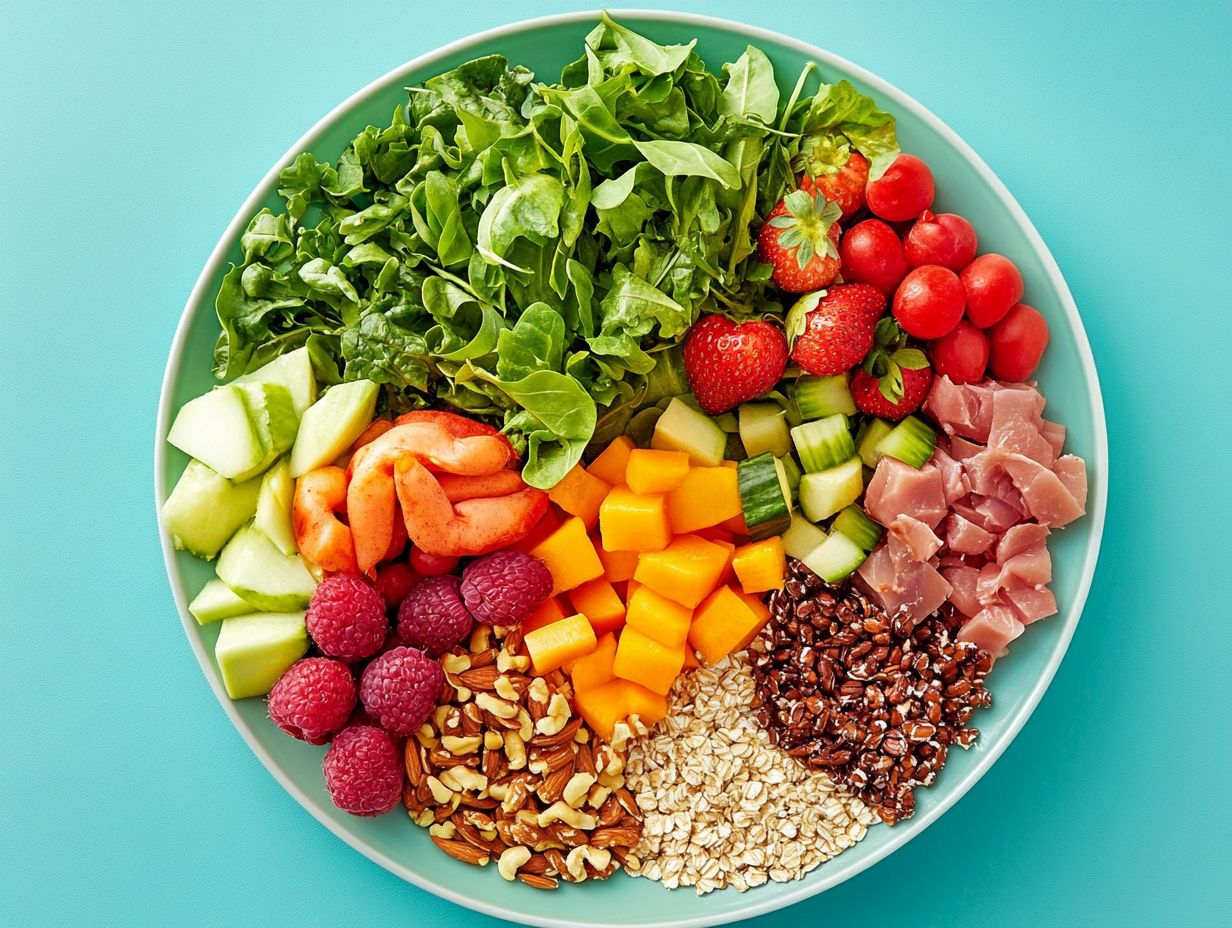
Vitamins and minerals are essential nutrients that support various body functions, including nutrient absorption and immune function. Their importance in a healthy diet is huge.
These small nutrients can be divided into two categories: water-soluble and fat-soluble vitamins. For example, B vitamins, like B12 and folate, are crucial for energy metabolism and red blood cell formation. Vitamin D, a fat-soluble vitamin, is essential for calcium absorption and bone health.
Minerals like calcium and magnesium are equally important for muscle function and nerve transmission. You can find these vital minerals in green leafy vegetables, nuts, and dairy.
By maintaining adequate levels of these vitamins and minerals, you support your overall health and boost your mood. Make it a priority to enjoy a colorful mix of nutrient-rich foods every day for your best health!
5. Water
Water is often underestimated, yet it is a cornerstone of overall well-being. This essential nutrient plays a vital role in digestion, nutrient absorption, and maintaining balance within your body.
Water does much more than quench your thirst; it regulates body temperature, flushes out toxins, and supports joint lubrication and skin health. Recognizing the importance of adequate hydration can lead to improvements in physical performance and cognitive function.
Here are some easy ways to stay hydrated:
- Set daily hydration goals.
- Include water-rich foods in your meals.
- Carry a reusable water bottle as a reminder.
Start these simple habits today to unlock the benefits of hydration and pave the way for a healthier lifestyle.
Why Is a Balanced Diet Important?
A balanced diet is essential for your well-being. It ensures you receive necessary nutrients, supports bodily functions, and lowers chronic disease risk all while following dietary guidelines for optimal health.
When you incorporate a variety of foods from all food groups such as fruits, vegetables, whole grains, lean proteins, and healthy fats you create a rich tapestry of nutrients. These components boost energy levels, enhance immune function, and aid in muscle recovery.
Don t underestimate the power of vitamins and minerals; they are crucial for metabolic processes and significantly impact mental health.
By embracing diversity in your food choices, you can enjoy improved digestion and reduced inflammation, paving the way for a healthier, more vibrant lifestyle.
How Can One Ensure They Are Getting Enough of These Nutrients?
To ensure you’re getting enough essential nutrients, prioritize nutrient-rich foods to incorporate daily in your diet. If needed, consult a healthcare provider about dietary supplements that can complement your intake.
Incorporating a diverse range of foods into your meals enhances flavor and boosts your intake of vitamins, minerals, and other essential nutrients. For instance, fill half your plate with a mix of colorful fruits and vegetables at each meal.
Tracking what you eat through food diaries or mobile apps can provide insights into your dietary patterns and highlight areas for improvement.
If you have dietary restrictions or health conditions, supplements can offer support, but tailor them to your needs after discussing options with a health professional.
What Are the Consequences of Not Getting Enough of These Nutrients?
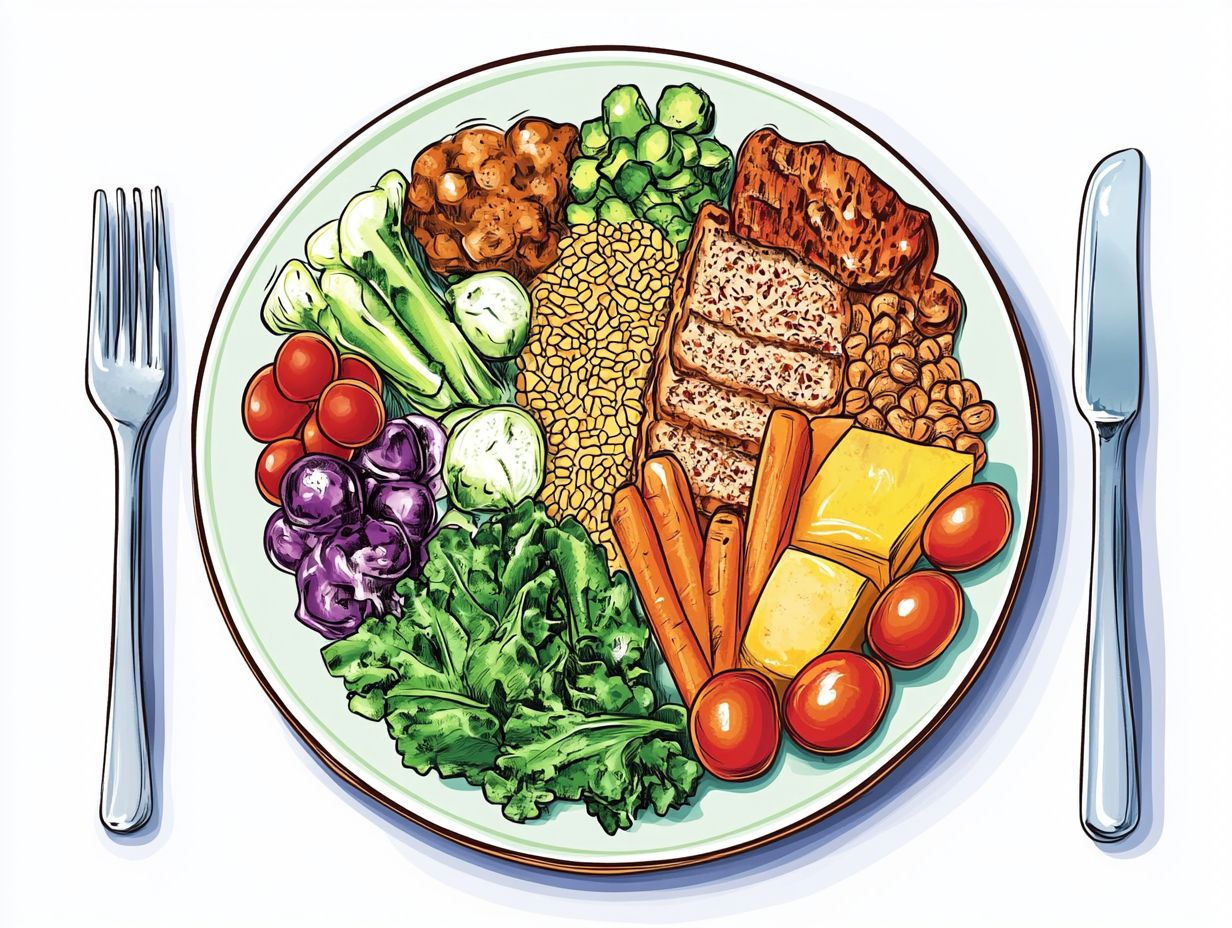
Not getting enough essential nutrients can cause serious vitamin deficiencies. This can negatively affect your body s function, growth, and development, ultimately diminishing your overall health and well-being.
Take vitamin D, for example. A deficiency can impede your body s ability to absorb calcium, resulting in weakened bones and a heightened risk of fractures, especially as you age.
Then there are the B vitamins. These vital nutrients, including B12, are essential for energy and brain function. Skipping them can leave you feeling fatigued, irritable, and may even lead to cognitive decline, with studies linking low B12 levels to memory issues.
The effects go beyond just physical capabilities; they can seep into your mental health, manifesting as mood swings and depressive symptoms. Continuous research emphasizes the vital importance of maintaining a balanced diet, showcasing the potential repercussions of neglecting nutrient needs.
Don t wait until it s too late to address nutrient deficiencies! Doing so could pave the way for chronic health conditions and a reduced quality of life.
How Can One Incorporate These Nutrients into Their Diet?
Incorporating essential nutrients into your diet is achievable through conscious food choices and a firm commitment to healthy eating. For example, being aware of the 5 essential vitamins in dietary guidelines can help you easily boost your health!
Consider exploring a vibrant variety of fruits and vegetables, each offering unique vitamins and minerals that are vital for your overall health. For instance, leafy greens are packed with antioxidants, while citrus fruits provide a wealth of vitamin C to strengthen your immune system.
Integrating whole grains like quinoa or brown rice into your meals can offer essential fiber and B vitamins that your body craves. Lean proteins, such as fish, legumes, and poultry, play a crucial role in supporting muscle health and keeping you satiated.
By planning your meals ahead and including a diverse range of food sources, you can effortlessly maintain a balanced nutrient profile throughout the week. Start making small changes today for a healthier tomorrow!
What Are Some Common Misconceptions About These Nutrients?
Several common misconceptions cloud the understanding of essential nutrients, often leading to confusion about their roles in health and the dietary guidelines you should follow for optimal nutrition.
For example, many believe high-protein diets are only for athletes, but protein is important for everyone. It serves essential functions such as muscle repair, immune support, and enzyme production.
Additionally, it s a widespread belief that all fats are harmful, which overlooks the critical distinction between saturated and unsaturated fats. While it s wise to limit saturated fats, the unsaturated fats found in avocados and olive oil are actually vital for heart health and can enhance nutrient absorption.
By addressing these misconceptions, you can make informed dietary choices that meet your body’s nutritional needs, ultimately leading to better health outcomes.
How Can One Maintain a Healthy Diet While Eating Out?
Maintaining a healthy diet while dining out is entirely achievable when you make informed food choices that prioritize nutrient-rich options. This approach ultimately reduces your risk of heart disease and other health issues.
By mastering the art of navigating restaurant menus, you can elevate your dining experiences without sacrificing your health goals. Seek out dishes loaded with vegetables, whole grains, and lean proteins; these selections typically provide essential nutrients and keep empty calories at bay.
When faced with the allure of indulgent desserts, consider sharing or opting for smaller portions to satisfy your cravings without going overboard. Don t hesitate to request dressings or sauces on the side; this simple act can enable you to control your consumption, allowing for a delightful balance between enjoyment and well-being with every meal.
Frequently Asked Questions
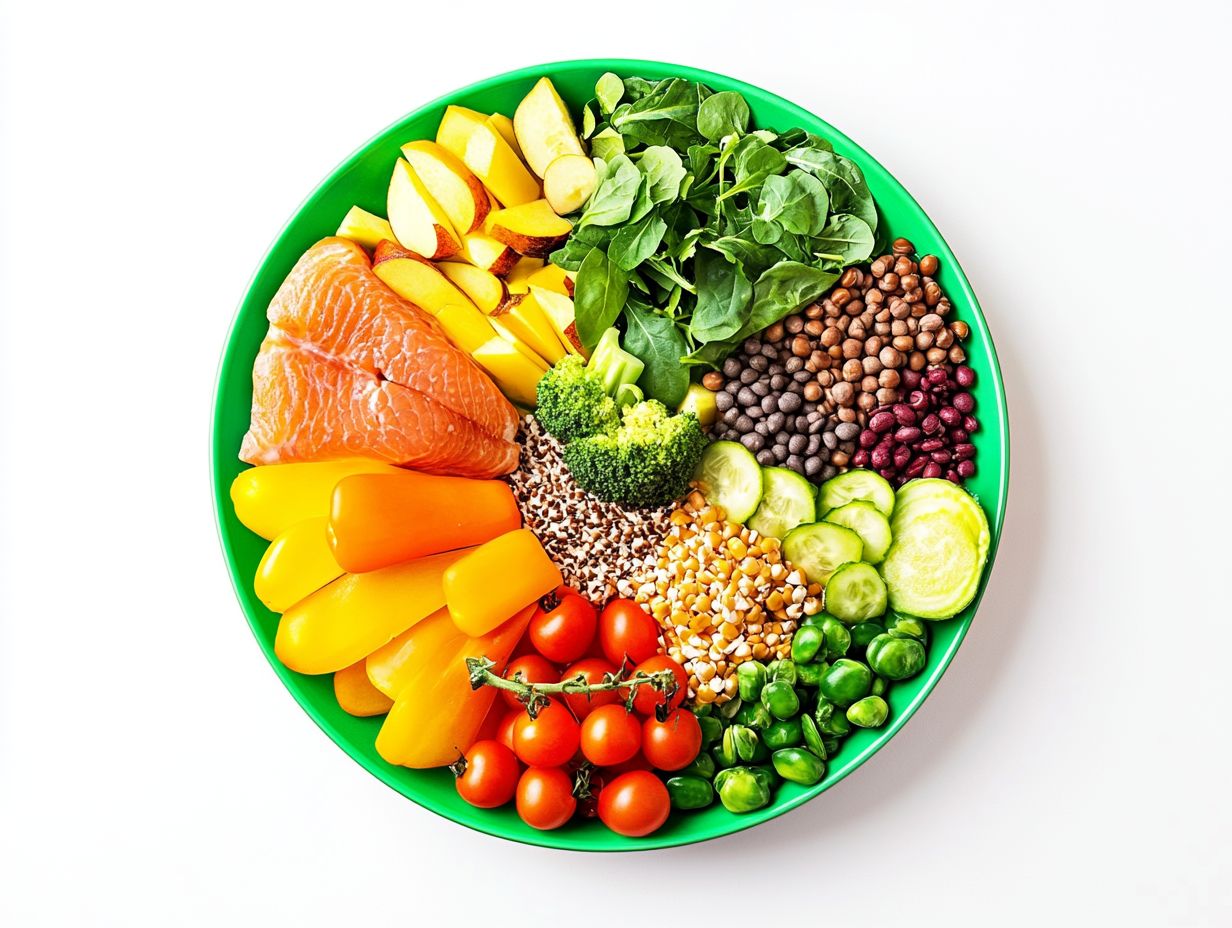
What are the 5 essential nutrients for healthy eating?
The 5 essential nutrients for healthy eating are carbohydrates, proteins, fats, vitamins, and nutrient-dense foods for a healthy diet.
Why are carbohydrates important for a healthy diet?
Carbohydrates provide energy. They fuel our brain and muscles, helping us stay active and alert.
How do proteins contribute to a healthy diet?
Proteins build and repair tissues. They also help create important substances that support our immune system.
Is it necessary to include fats in our diet?
Yes, fats are vital for absorbing certain vitamins and protecting our organs. Choose healthy fats like avocados, nuts, and olive oil for the best benefits.
How do vitamins benefit our overall health?
Vitamins support a healthy immune system. They also help produce red blood cells and promote healthy skin, hair, and nails.
Why do we need minerals in our diet?
Minerals are crucial for our body’s functions. They build strong bones, maintain a healthy heart rhythm, and regulate metabolism.

